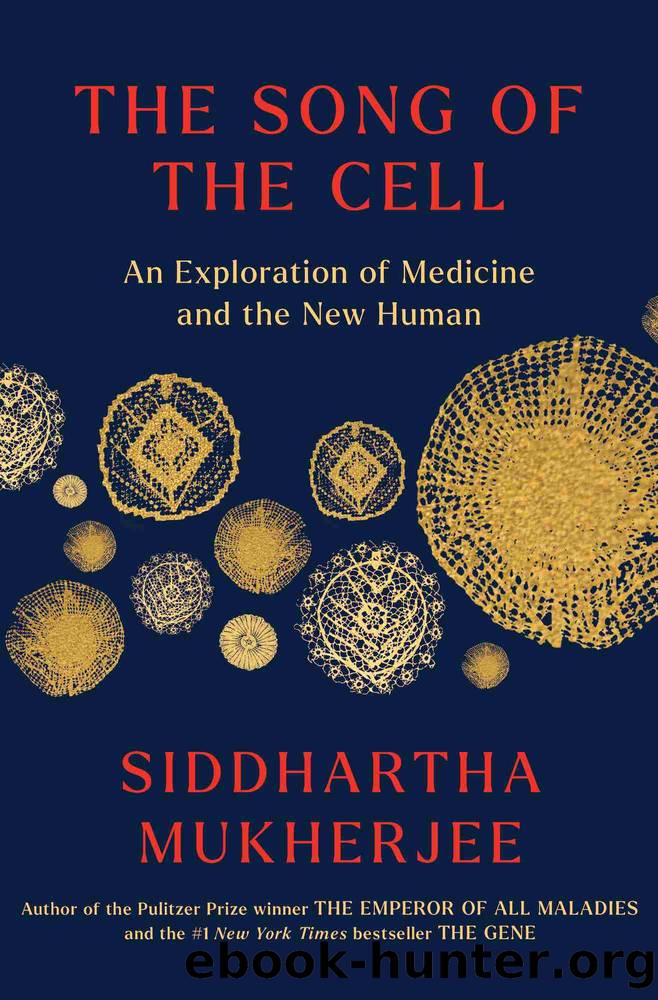The Song of the Cell: an Exploration of Medicine and the New Human by Siddhartha Mukherjee

Author:Siddhartha Mukherjee
Language: eng
Format: epub
Publisher: Scribner
Published: 2022-10-25T00:00:00+00:00
* * *
I finished this part of the book, coincidentally, on a Monday morning, the day I reserve to look at blood. I left the office where I usually write and walked down the corridor to the microscope room. Empty and silent, thankfully. The lights went down, the scope flickered on. A box of glass slides was waiting on the table. I mounted one on the scope and turned the focusing knob.
Blood. A cosmos of cells. The restless ones: red blood cells. The guardians: multilobed neutrophils that mount the first phases of the immune response. The healers: tiny plateletsâonce-dismissed as fragmentary nonsenseâthat redefined how we respond to breaches in the body. The defenders, the discerners: B cells that make antibody missiles; T cells, door-to-door wanderers that can detect even the whiff of an invader, including, possibly, cancer.
As my eyes darted from one cell to another, I thought about the trajectory of this book. Our story has moved. Our vocabulary has shifted. Our metaphors have changed. Flip back a few pages, and we imagined the cell as a lone spaceship. Then, in the chapter âThe Dividing Cell,â the cell was no longer single but became the progenitors of two cells, and then four. It was a founder, the originator of tissues, organs, bodiesâfulfilling the dream of one cell becoming two and four. And then it transformed into a colony: the developing embryo, with cells settling and positioning themselves within the landscape of an organism.
And blood? It is a conglomerate of organs, a system of systems. It has built training camps for its armies (lymph nodes), highways and alleys to move its cells (blood vessels). It has citadels and walls that are constantly being surveyed and repaired by its residents (neutrophils and platelets). It has invented a system of identification cards to recognize its citizens and eject intruders (T cells) and an army to guard itself from invaders (B cells). It has evolved language, organization, memory, architecture, subcultures, and self-recognition. A new metaphor comes to mind. Perhaps we might think of it as a cellular civilization.
Download
This site does not store any files on its server. We only index and link to content provided by other sites. Please contact the content providers to delete copyright contents if any and email us, we'll remove relevant links or contents immediately.
| ASVAB | GED |
| GRE | NCLEX |
| PRAXIS | SAT |
| See more | Flash Cards |
| Study Guides | Study Skills |
| Workbooks |
Talking to Strangers by Malcolm Gladwell(13347)
The Compound Effect by Darren Hardy(8948)
Tools of Titans by Timothy Ferriss(8365)
Wonder by R. J. Palacio(8097)
The Lover by Duras Marguerite(7893)
A Court of Wings and Ruin by Sarah J. Maas(7821)
The Circle by Dave Eggers(7104)
Deep Work by Cal Newport(7064)
Kaplan MCAT General Chemistry Review by Kaplan(6926)
To All the Boys I've Loved Before by Jenny Han(5841)
Wiseguy by Nicholas Pileggi(5770)
The Body: A Guide for Occupants by Bill Bryson(5080)
Eat That Frog! by Brian Tracy(4526)
1,001 ASVAB Practice Questions For Dummies by Powers Rod(4500)
Cracking the GRE Premium Edition with 6 Practice Tests, 2015 (Graduate School Test Preparation) by Princeton Review(4281)
Pre-Suasion: A Revolutionary Way to Influence and Persuade by Robert Cialdini(4224)
Barron's AP Biology by Goldberg M.S. Deborah T(4146)
ACT Math For Dummies by Zegarelli Mark(4043)
Alive: The Story of the Andes Survivors by Piers Paul Read(4018)
